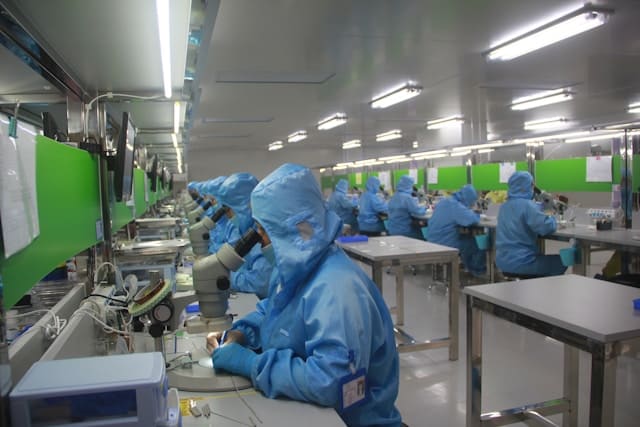In the realm of biological sciences, synthetic biology is a star that has been rapidly ascending. Imagine possessing the ability to engineer cells to execute specific tasks, just like programming a computer. Pioneers in this field can engineer bacteria that can produce biofuels, organisms that emit light, or yeast cells that can churn out pharmaceutical drugs. We’re living in an age where artificial DNA can be designed on Google and ordered online. Exciting as it is, it’s not just the realms of fantasy. This is happening today, with the UK at the forefront of this cutting edge technology.
Synthetic Biology: An Overview
Synthetic biology, a modern offshoot of biological engineering, is about re-designing existing, natural biological systems for useful purposes, or constructing new, artificial ones. This isn’t merely science fiction. In the laboratories of companies, scholars and innovators, these concepts are being transformed into reality.
A lire en complément : How Can Aquaponics Systems Contribute to Sustainable Food Production in the UK?
At its core, synthetic biology is the application of principles of engineering to biological systems, such as cells and DNA. It is all about standardisation, automation, and scalability. By using the tools of synthetic biology, scientists hope to build new biological parts, devices, and systems, or redesign existing ones for useful purposes.
Synthetic Biology and the Pharmaceutical Industry
In recent years, synthetic biology has begun to revolutionise the pharmaceutical industry. In the UK, there is a concentrated push towards the development of this technology in the pharmaceutical sector. Several companies, backed by European innovation initiatives, are harnessing the potential of synthetic biology for drug production.
En parallèle : How to Foster Green Innovation in the UK’s Small Business Sector?
The pharmaceutical industry relies heavily on complex chemical reactions to produce drugs. Synthetic biology, however, uses engineered cells as mini factories to produce therapeutic compounds. This cell-based production method offers more flexibility and sustainability compared to traditional methods.
Role of Synthetic Biology in Drug Development
The real potential of synthetic biology in drug development lies in its unprecedented control over the intricacies of cellular metabolism. Scientists can engineer cells to produce drugs with greater efficiency and precision. This can lead to more effective treatments, with fewer side effects.
Synthetic biology allows for the development of personalised medicines, which are customised to a patient’s unique genetic makeup. This is a leap forward from the ‘one-size-fits-all’ approach, offering more effective treatments tailored to individual needs.
Moreover, synthetic biology enables the development of new classes of drugs. For instance, engineered bacteria can produce novel antibiotics, a crucial weapon in our fight against antibiotic resistance, a growing global health threat.
Synthetic Biology Companies in the UK
The UK is home to several companies that are making significant strides in synthetic biology. For instance, Synthace, based in London, is using synthetic biology to automate and improve the reliability of biological research. Another company, Oxitec, develops genetically engineered insects to control vector-borne diseases.
These companies receive support from the UK government and European innovation initiatives, creating a favourable environment for the growth and development of synthetic biology.
Future Perspectives for Synthetic Biology
The future of synthetic biology in the UK’s pharmaceutical industry is bright. The advancements in synthetic biology are expected to drive significant improvements in the production of medicines, leading to more effective treatments and potentially lowering the cost of drugs. This could have profound implications for healthcare, both in the UK and globally.
As synthetic biology continues to evolve, more opportunities will emerge. With the right infrastructure and support in place, the UK is well-positioned to lead the way in this exciting new realm of science and technology.
In the information era, with the entire human genome sequenced and available on online platforms like PubMed and PMC, synthetic biology is set to redefine the pharmaceutical industry. The marriage of digital technology and biology is creating a world where the creation of new life forms and drugs is as easy as typing words into Google.
The potential of synthetic biology in the UK’s pharmaceutical industry is immense. It offers new ways to design and produce medicines, paving the way for personalised treatments and novel drugs. As we continue to unlock the secrets of biological systems, the possibilities are virtually limitless. Let’s watch this space, for synthetic biology is poised to change the face of medicine as we know it.
Drug Discovery and Synthetic Biology: The New Era
The advent of synthetic biology has opened up a new era in drug discovery. This discipline enables scientists to design and engineer new biological parts, systems, and organisms that can be used in the development of new drugs. It’s like having a new toolset for creating medicines that could not be imagined before.
An important aspect of synthetic biology in drug discovery is the use of cell-based or cell-free systems. Cell-based systems involve engineering cells to produce therapeutic compounds. Cell-free systems, on the other hand, use the machinery of cells without the cells themselves. Both systems have the potential to revolutionise the way drugs are discovered and produced.
Using synthetic biology, scientists can manipulate the metabolic engineering of cells to produce drugs. Metabolic engineering involves the manipulation of cellular metabolic pathways. This can lead to the production of new compounds or the improvement of existing ones, paving the way for the discovery of novel drugs.
Additionally, synthetic biology allows for greater precision in drug discovery. By controlling gene expression, scientists can engineer cells to produce specific therapeutic compounds. This level of control can lead to the development of more effective and potent drugs.
The use of synthetic biology in drug discovery is not limited to the laboratories of UK’s biology companies. Researchers across the globe, from the United States to the European Union, are harnessing the power of synthetic biology for drug discovery. This global momentum, combined with the UK’s leadership in synthetic biology, makes the future of drug discovery incredibly promising.
Conclusion: The Future of Synthetic Biology in UK’s Pharmaceutical Industry
In conclusion, synthetic biology has immense potential in the UK’s pharmaceutical industry. This cutting-edge technology is revolutionising how we discover and produce drugs. It is enabling the development of personalised medicine, where treatments are customised to an individual’s genetic makeup. This shift from a ‘one-size-fits-all’ approach to personalised treatment could transform patient care and outcomes.
Synthetic biology is also facilitating the development of novel drugs. The ability to engineer cells and manipulate metabolic pathways opens up new possibilities for drug discovery. This could be a game changer in our fight against diseases, including those that are currently resistant to existing drugs.
Moreover, synthetic biology is contributing to the sustainability of the pharmaceutical industry. The use of cell-based production methods offers more flexibility and sustainability compared to traditional methods. This could reduce the environmental impact of drug production, aligning the industry with global sustainability goals.
The UK is at the forefront of this revolution, with numerous biology companies leveraging synthetic biology for drug discovery and production. With continued support from the government and European innovation initiatives, the UK is well-positioned to maintain its leadership in this field.
The brilliance of synthetic biology is that it combines the power of biology and technology, creating a bridge between the two. Free articles and research papers available on platforms like Google Scholar, PubMed, and PMC are testament to the exponential growth and excitement in this field.
The potential of synthetic biology is only just beginning to be realised. The UK’s pharmaceutical industry is on the cusp of a new era, one that is driven by synthetic biology. The possibilities are virtually limitless and the future holds great promise. This is an exciting time to be in the field of synthetic biology, as we witness the dawn of a new age in drug discovery and production.






